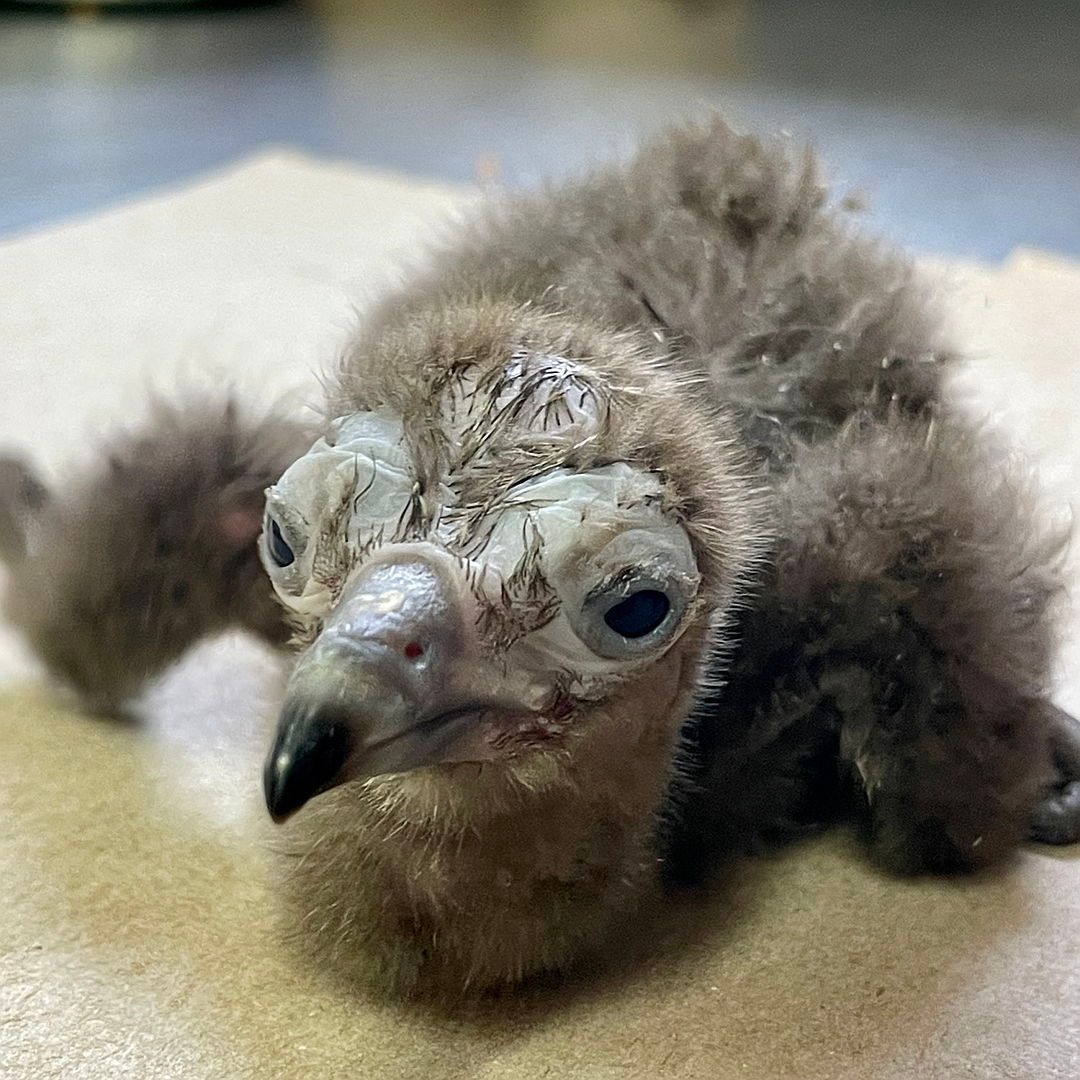- The importance of International Vulture Awareness Day
- The current conservation status of Hooded Vultures and the challenges they face
- The role of zoos in vulture conservation
- A closer look at the rearing of Hooded Vultures in captivity
- Educational and public engagement efforts surrounding vulture conservation
International Vulture Awareness Day (IVAD) is a significant event observed globally to draw attention to the vital ecological roles played by vultures and the pressing conservation challenges they face. Celebrated every year on the first Saturday of September, this day encourages educational activities and public engagement focused on vulture species. This September 7th, in celebration of IVAD, we shine a light on the Hooded Vulture (Necrosyrtes monachus), a critically endangered species. Our team at the Birds of Africa section has successfully reared a 2024 hatchling, adding a promising prospect to our conservational breeding efforts.
The importance of International Vulture Awareness Day cannot be overstated. Vultures are among the most crucial scavengers in ecosystems worldwide. They expedite the decomposition process, consuming carrion that would otherwise pose a health risk through the proliferation of diseases. However, vulture populations are in sharp decline due to several anthropogenic factors. International Vulture Awareness Day serves as a platform to amplify the plight of vultures, attract funding for conservation initiatives, and foster a deeper understanding amongst the public about these often-misunderstood birds.
Hooded Vultures, specifically, face an array of threats, relegating them to the critically endangered category on the IUCN Red List. Their population has been decimated by factors such as habitat loss, poisoning, hunting for traditional medicine, and drastic decreases in food availability. The survival of Hooded Vultures hinges on aggressive and informed conservation strategies. This includes direct interventions like habitat protection, as well as addressing underlying causes such as human-wildlife conflict and cultural perceptions.
Zoos play an indispensable role in vulture conservation. Besides serving as ambassadors of their wild counterparts, zoo populations provide genetic reservoirs that can bolster wild populations through carefully managed breeding programs. By studying vultures in captivity, researchers can obtain critical data on behavior, health, and reproduction which can guide in-situ conservation efforts. Our zoo’s commitment to raising Hooded Vultures includes implementing best practices in husbandry, environmental enrichment, and veterinary care.
A closer look at the rearing of Hooded Vultures in captivity reveals the intricate care required for their successful upbringing. From ensuring the controlled incubation of eggs to fostering appropriate social behaviors in young vultures, every stage is crucial. The 2024 hatchling currently housed in the Birds of Africa yard is a testament to the dedication of our zookeeping team. The careful monitoring of diet, health checks, and socialization with other vultures in the yard encapsulates the depth of effort put into the rearing process. Captive rearing doesn’t just add numbers; it improves genetic diversity and facilitates future reintroduction programs.
Educational and public engagement efforts are key to the success of any conservation program. By involving the public in vulture conservation, we aim to dispel myths and foster a sense of stewardship towards these vital birds. During the week leading up to International Vulture Awareness Day, visitors to the Birds of Africa exhibit can see firsthand the young Hooded Vulture and learn about the threats these birds face in the wild. Education sessions, interactive displays, and special activities designed for all age groups help demystify vulture behavior and emphasize their ecological importance. Engaging the community boosts awareness and mobilizes support for broader conservation initiatives.
In conclusion, celebrating International Vulture Awareness Day is a pivotal step towards shifting public perception and garnering support for vulture conservation. The critical position of Hooded Vultures in ecosystems, combined with human-caused threats, underscores the necessity for comprehensive conservation efforts. Zoos serve as sanctuaries and research hubs, playing a crucial role in safeguarding these magnificent birds. By participating in educational activities and supporting conservation programs, we can collectively contribute to the survival and flourishing of vultures in the wild.
*****
Source Description
We love our Vultures! 🫶 International Vulture Awareness Day is Saturday September 7th and we’ll be celebrating our incredible vultures all week long! To start us off, here’s an adorably fluffy baby Hooded Vulture. A 2024 hatchling that is hopping around the Birds of Africa yard with the rest of the vulture clan.
Hooded Vultures are critically endangered, and our team of Zookeepers does an amazing job rearing new additions to the zoo population.
📷 Baby Hooded Vulture photos – from recently hatched to ready to join the group. Photos are provided by Ashley, Senior Keeper; Gen, General Curator; and JCB, Forge A Path Media.


